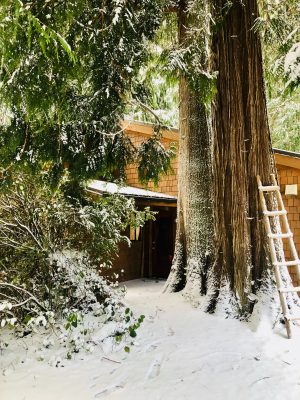 This is Cedar Lodge. It is so named (recently, and by me) because it sits in a grove of massive cedar trees, near a lake, on an island, in the Salish Sea. And because I like to name a home.
This is Cedar Lodge. It is so named (recently, and by me) because it sits in a grove of massive cedar trees, near a lake, on an island, in the Salish Sea. And because I like to name a home.
My home is tucked away, more a Hobbit house than a mansion. One can’t get much more “tucked away” without either going to prison (not yet tried, because I am, well, just too attractive and so life would be hell, most days.) Or entering a monastery (which works for some, but for many, it is just a way to avoid something…sex, responsibility, creative problem-solving, the past, authentic friendship, bill-paying, the list goes on.) And by the way, though I never chose to try prison, I have tried the monastic life.
When I left the monastery, my friend Kevin sat on my bed as I packed my case (when one leaves this particular monastery, one is catapulted outside the cloister overnight so that the seeds of discontent are not spread.) He said something I will never forget and for which I will always be grateful. “Charles, some leave a monastery cloister because the life does not fit. Some because they cannot handle obedience (the only really troubling vow) but you are leaving because you are good at friendship while we are all here, and will remain here in this cloister because we are not.”
They say “fake it ’till you make it” and in AA I understand the idea. But outside certain situations, faking it until you make it is, well, fraud. Take Bernie Madoff, for example. Or Elizabeth Holmes of Theranos, Inc., or a recent diocesan pastoral failure or a failed capital campaign. (Call me, I’ll tell you all about it!)
Growing up with a mentally unwell mother and an abandoning father set me on a difficult path in which I was often unaware that I was being triggered. The diagnosis is CPTSD. The “C”: is for “Complex” and it refers to trauma experienced in childhood that is repeated in adulthood – in my case in the church. When I left the church the bishop required that I see a therapist. It has helped. She is the one who suggested I tell my story to the public – to help others abused by bullying bishops. Who knew that the bishop’s mandate would be so fruitful so helpful to 19,000 Sip readers and 3,500 Facebook friends.
So I left the church and live, and write, on this island in this 1,000-square foot cottage. People who live on Whidbey Island refer to the mainland as “America” (“I need to go to “America” for a doctor’s appointment (in Seattle.)”) And still, others call Whidbey “a home with a mote.” People go to islands to find protection and magic.
Recovering from CPTSD takes daily work and will be unfinished when I die. But work one must, since the work protects others from the inevitable shrapnel of daily or weekly or monthly unseen landmines.
One of the things I love about Christmas is how many songs and hymns have a sadness to them. They shift into minor keys. They refer to real life. And the feasts after Christmas – the Feast of the Murder of the Innocents for example (thousands of babies tossed into the air and split in two by swords) – is, well, today. always two days after Christmas.
Don’t fake it. It does not help you to “make it.”
Just try harder and harder to be honest – to battle your own ego, to do good self-examination. The Church in all its pomp and circumstance tries to impress – massive cathedrals, stained glass, bishop’s (overcompensating) miters, massive wheels on small trucks (oh, wait, the massive wheels thing is a different group), etc.
I used to need to live in an impressive house. I used to need an impressive title. I used to need a job in an impressive Bishop’s office or Cathedral. But in time I began to choose less pomp and rather more circumstance.
It’s ok not to appear to have made it. It’s ok to look like you failed. It’s ok to be “canceled” in the culture growing that name. It’s ok to be lied about by your bishop or canon to the ordinary or twitter-storm or ex-spouse; or whoever lies about you. Small people whisper lies. Let them. It’s ok to fail even – really to fail. Just chop your wood and carry your water, today. This one day. Then, tomorrow, do it again. Often it is the Innocents who die. Be one. Hand them the sword even. Bow your head.
Be judged by your kindness, not the size of your swords, your canons, or your tires.

